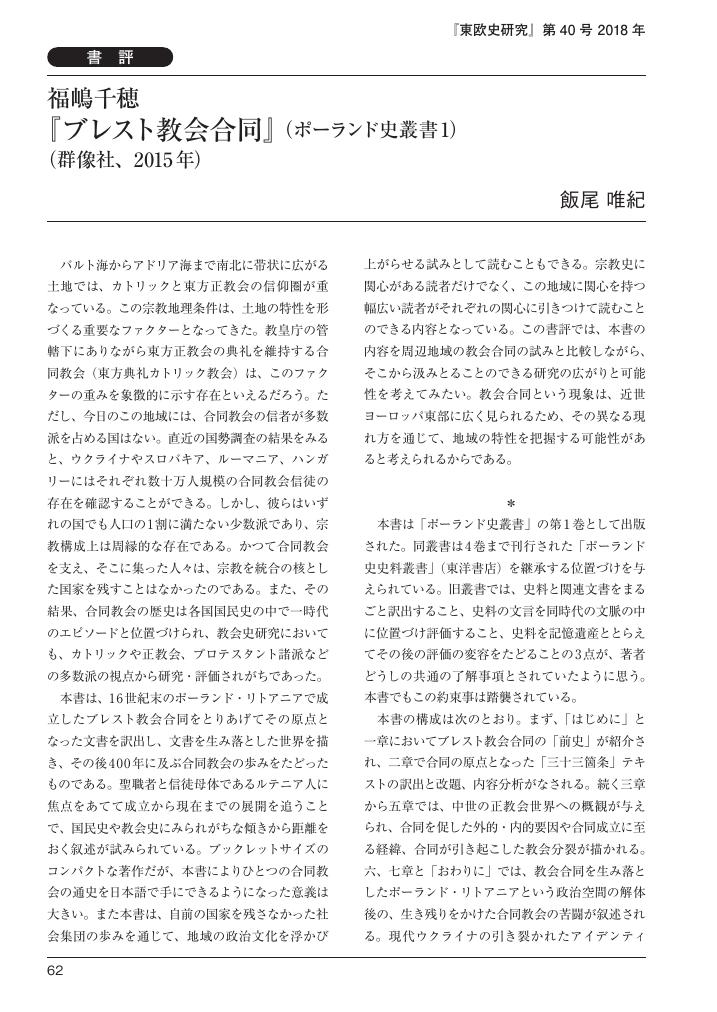1 0 0 0 OA 近世ハンガリーの教区秩序と村落・市場町 北東部ゼムプレーン州の教区運営の事例から
- 著者
- 飯尾 唯紀
- 出版者
- 日本西洋史学会
- 雑誌
- 西洋史学 (ISSN:03869253)
- 巻号頁・発行日
- vol.212, pp.1, 2003 (Released:2022-04-01)
1 0 0 0 OA 【コメント】 東欧史における「宗派化」・「世俗化」の類型化について
- 著者
- 飯尾 唯紀
- 出版者
- 東欧史研究会
- 雑誌
- 東欧史研究 (ISSN:03866904)
- 巻号頁・発行日
- vol.40, pp.148-152, 2018 (Released:2022-02-13)
1 0 0 0 OA 福嶋千穂 『ブレスト教会合同』 (ポーランド史叢書1)(群像社、2015年)
- 著者
- 飯尾 唯紀
- 出版者
- 東欧史研究会
- 雑誌
- 東欧史研究 (ISSN:03866904)
- 巻号頁・発行日
- vol.40, pp.62-66, 2018 (Released:2022-02-13)
1 0 0 0 OA ハンガリー王国北東部の領主裁判と村落・市場町
- 著者
- 飯尾 唯紀
- 出版者
- 東欧史研究会
- 雑誌
- 東欧史研究 (ISSN:03866904)
- 巻号頁・発行日
- vol.27, pp.26-45, 2005 (Released:2019-04-14)
- 著者
- 飯尾 唯紀 イイオ タダキ Tadaki Iio
- 雑誌
- 史苑
- 巻号頁・発行日
- vol.82, no.2, pp.95-109, 2022-03
1 0 0 0 1918-19年像の再構築―継続と変容―
- 著者
- 大津留 厚 柴 理子 桐生 裕子 野村 真理 家田 修 篠原 琢 佐藤 雪野 馬場 優 柴 宜弘 辻河 典子 森下 嘉之 飯尾 唯紀 村上 亮 ボシティアン ベルタラニチュ 米岡 大輔
- 出版者
- 神戸大学
- 雑誌
- 基盤研究(A)
- 巻号頁・発行日
- 2017-04-01
1939年9月4日、アメリカ合衆国の週刊誌『タイム』はその前の週の9月1日にドイツ軍がポーランドに侵攻したのを受けて、「第二次世界大戦が始まった」と報じた。この時、「その前の戦争」が第一次世界大戦の名を与えられることになったと言える。その意味での第一次世界大戦が始まるきっかけになったのは、ハプスブルク家を君主とする諸領邦が最終的に名乗ったオーストリア=ハンガリーが、隣国セルビアに対して、ハプスブルク君主の継承者の暗殺の責を問うて宣戦を布告したことにあった。そしてその戦争を終えるための講和会議が開かれた時、すでにこの国は講和会議に代表される存在であることを止めていた。したがってこの戦争はこの国にとっては「最後の戦争」に他ならなかった。1914年からあるいはその前から始まった、ヨーロッパを主な戦場とする戦争を何と呼ぶのか、これがそれから100年経ったときに問われている。そして呼び方の問題はその戦争の継続した期間の捉え方と関係し、またその後の世界の把握の方法とも関係している。本科研ではセルビア共和国の代表的な現代史研究者ミラン・リストヴィッチ教授を招き、また研究代表者がウィーンで開催された1918年の持つ意味を再考するシンポジウムに参加して国際的な研究動向を踏まえながら、分担者がそれぞれ研究を進めてきた。その成果は2019年5月に静岡大学で開催される西洋史学会の小シンポジウムで発表されることになる。そこでは研究代表者が趣旨説明を行い、「国境の画定」、「制度的連続性と断絶」、「アイデンティティの変容」それぞれの班から報告が行われる。
1 0 0 0 OA 近世ハンガリー王国における「信教の自由」 : 1608年法令第1条の解釈をめぐって
- 著者
- 飯尾 唯紀
- 出版者
- 北海道大学スラブ研究センター
- 雑誌
- スラヴ研究 (ISSN:05626579)
- 巻号頁・発行日
- vol.48, pp.95-112, 2001
In Habsburg Hungary, the religious liberty of all estates came into force by the Act of 1608. This article was enacted in the years of crisis of the Habsburg rule, and had been valid, with a little modification, until the end of the 17th century. It has been proposed that this article, accordant with the system of "Neo-Serfdom," gave the religious liberty only to the feudal lords and free royal towns, not to the serfs. In the struggle between the foreign dynasty and domestic feudal lords, the former gave up to intervene in the affairs of serfs. On the other hand, feudal lords reinforced the power on their serfs not only in the physical, but in the spiritual sphere too. For feudal lords, their privilege on religious affairs was self-evident on the premise that they assigned to themselves the power of exercising the right of church-patron. This paper aims at questioning this established account and pointing out two central problems. First, this account regards the act as a part of the regulation of serfdom. Investigating the process of enactment, however, it appeared that the main issue was not on serfs but on the people who lived on those lands belonging to the crown. The second point of debate is about an understanding of the word "villa" [village]. This was interpreted as an expression of the right of non-Catholic church patron to keep their serfs on their side. However, concerning the understanding of the word "villa," we must take into consideration the discretionary power of congregation, which had been developed through late medieval times. As the role of congregation was diverged in each part of the state, there were frequent signs of clashes of opinions among Hungarian feudal lords on the question of the religious liberty of villages. The Act of 1608 declared that the king could not interfere in religious affairs in Hungary, but the right of the villages was not denied. The relation between patron and congregation became a keen issue on the Diet after the 1610s, when the western magnates returned to the Catholic church, and friction between them arose again throughout the Kingdom.



